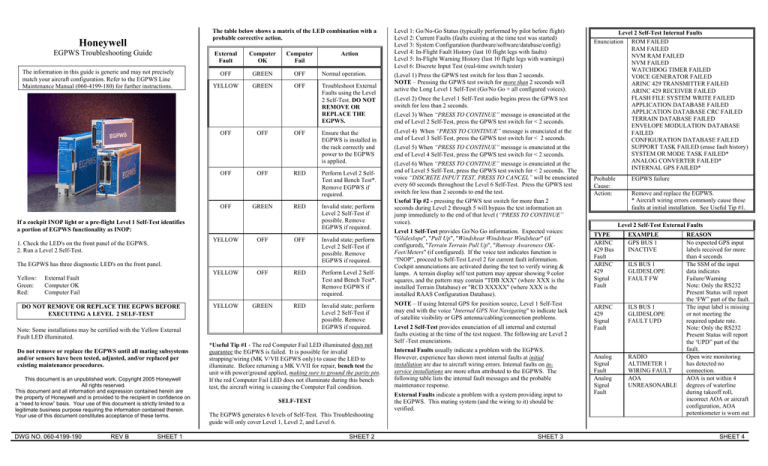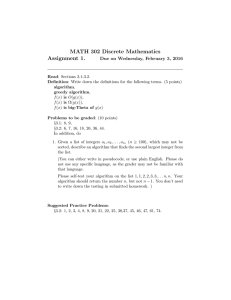
The table below shows a matrix of the LED combination with a
probable corrective action.
Honeywell
EGPWS Troubleshooting Guide
The information in this guide is generic and may not precisely
match your aircraft configuration. Refer to the EGPWS Line
Maintenance Manual (060-4199-180) for further instructions.
External
Fault
Computer
OK
Computer
Fail
OFF
GREEN
OFF
Normal operation.
YELLOW
GREEN
OFF
Troubleshoot External
Faults using the Level
2 Self-Test. DO NOT
REMOVE OR
REPLACE THE
EGPWS.
OFF
OFF
OFF
OFF
OFF
GREEN
OFF
RED
RED
If a cockpit INOP light or a pre-flight Level 1 Self-Test identifies
a portion of EGPWS functionality as INOP:
1. Check the LED's on the front panel of the EGPWS.
2. Run a Level 2 Self-Test.
External Fault
Computer OK
Computer Fail
DO NOT REMOVE OR REPLACE THE EGPWS BEFORE
EXECUTING A LEVEL 2 SELF-TEST
This document is an unpublished work. Copyright 2005 Honeywell
All rights reserved.
This document and all information and expression contained herein are
the property of Honeywell and is provided to the recipient in confidence on
a “need to know” basis. Your use of this document is strictly limited to a
legitimate business purpose requiring the information contained therein.
Your use of this document constitutes acceptance of these terms.
DWG NO. 060-4199-190
REV B
SHEET 1
Perform Level 2 SelfTest and Bench Test*.
Remove EGPWS if
required.
Invalid state; perform
Level 2 Self-Test if
possible. Remove
EGPWS if required.
OFF
OFF
Invalid state; perform
Level 2 Self-Test if
possible. Remove
EGPWS if required.
YELLOW
OFF
RED
Perform Level 2 SelfTest and Bench Test*.
Remove EGPWS if
required.
YELLOW
GREEN
RED
Invalid state; perform
Level 2 Self-Test if
possible. Remove
EGPWS if required.
Note: Some installations may be certified with the Yellow External
Fault LED illuminated.
Do not remove or replace the EGPWS until all mating subsystems
and/or sensors have been tested, adjusted, and/or replaced per
existing maintenance procedures.
Ensure that the
EGPWS is installed in
the rack correctly and
power to the EGPWS
is applied.
YELLOW
The EGPWS has three diagnostic LED's on the front panel.
Yellow:
Green:
Red:
Action
*Useful Tip #1 - The red Computer Fail LED illuminated does not
guarantee the EGPWS is failed. It is possible for invalid
strapping/wiring (MK V/VII EGPWS only) to cause the LED to
illuminate. Before returning a MK V/VII for repair, bench test the
unit with power/ground applied, making sure to ground the parity pin.
If the red Computer Fail LED does not illuminate during this bench
test, the aircraft wiring is causing the Computer Fail condition.
SELF-TEST
The EGPWS generates 6 levels of Self-Test. This Troubleshooting
guide will only cover Level 1, Level 2, and Level 6.
SHEET 2
Level 1: Go/No-Go Status (typically performed by pilot before flight)
Level 2: Current Faults (faults existing at the time test was started)
Level 3: System Configuration (hardware/software/database/config)
Level 4: In-Flight Fault History (last 10 flight legs with faults)
Level 5: In-Flight Warning History (last 10 flight legs with warnings)
Level 6: Discrete Input Test (real-time switch tester)
(Level 1) Press the GPWS test switch for less than 2 seconds.
NOTE – Pressing the GPWS test switch for more than 2 seconds will
active the Long Level 1 Self-Test (Go/No Go + all configured voices).
(Level 2) Once the Level 1 Self-Test audio begins press the GPWS test
switch for less than 2 seconds.
(Level 3) When “PRESS TO CONTINUE” message is enunciated at the
end of Level 2 Self-Test, press the GPWS test switch for < 2 seconds.
(Level 4) When “PRESS TO CONTINUE” message is enunciated at the
end of Level 3 Self-Test, press the GPWS test switch for < 2 seconds.
(Level 5) When “PRESS TO CONTINUE” message is enunciated at the
end of Level 4 Self-Test, press the GPWS test switch for < 2 seconds.
(Level 6) When “PRESS TO CONTINUE” message is enunciated at the
end of Level 5 Self-Test, press the GPWS test switch for < 2 seconds. The
voice “DISCRETE INPUT TEST, PRESS TO CANCEL” will be enunciated
every 60 seconds throughout the Level 6 Self-Test. Press the GPWS test
switch for less than 2 seconds to end the test.
Level 2 Self-Test Internal Faults
Enunciation ROM FAILED
RAM FAILED
NVM RAM FAILED
NVM FAILED
WATCHDOG TIMER FAILED
VOICE GENERATOR FAILED
ARINC 429 TRANSMITTER FAILED
ARINC 429 RECEIVER FAILED
FLASH FILE SYSTEM WRITE FAILED
APPLICATION DATABASE FAILED
APPLICATION DATABASE CRC FAILED
TERRAIN DATABASE FAILED
ENVELOPE MODULATION DATABASE
FAILED
CONFIGURATION DATABASE FAILED
SUPPORT TASK FAILED (erase fault history)
SYSTEM OR MODE TASK FAILED*
ANALOG CONVERTER FAILED*
INTERNAL GPS FAILED*
Probable
Cause:
Action:
Useful Tip #2 - pressing the GPWS test switch for more than 2
seconds during Level 2 through 5 will bypass the test information an
jump immediately to the end of that level (“PRESS TO CONTINUE”
voice).
Level 1 Self-Test provides Go/No Go information. Expected voices:
"Glideslope", "Pull Up", "Windshear Windshear Windshear" (if
configured), "Terrain Terrain Pull Up", "Runway Awareness OKFeet/Meters" (if configured). If the voice test indicates function is
“INOP”, proceed to Self-Test Level 2 for current fault information.
Cockpit annunciations are activated during the test to verify wiring &
lamps. A terrain display self test pattern may appear showing 9 color
squares, and the pattern may contain "TDB XXX" (where XXX is the
installed Terrain Database) or "RCD XXXXX" (where XXX is the
installed RAAS Configuration Database).
NOTE – If using Internal GPS for position source, Level 1 Self-Test
may end with the voice "Internal GPS Not Navigating" to indicate lack
of satellite visibility or GPS antenna/cabling/connection problems.
Level 2 Self-Test provides enunciation of all internal and external
faults existing at the time of the test request. The following are Level 2
Self -Test enunciations.
Internal Faults usually indicate a problem with the EGPWS.
However, experience has shown most internal faults at initial
installation are due to aircraft wiring errors. Internal faults on inservice installations are more often attributed to the EGPWS. The
following table lists the internal fault messages and the probable
maintenance response.
External Faults indicate a problem with a system providing input to
the EGPWS. This mating system (and the wiring to it) should be
verified.
SHEET 3
EGPWS failure
Remove and replace the EGPWS.
* Aircraft wiring errors commonly cause these
faults at initial installation. See Useful Tip #1.
Level 2 Self-Test External Faults
TYPE
ARINC
429 Bus
Fault
ARINC
429
Signal
Fault
EXAMPLE
GPS BUS 1
INACTIVE
ARINC
429
Signal
Fault
ILS BUS 1
GLIDESLOPE
FAULT UPD
Analog
Signal
Fault
Analog
Signal
Fault
RADIO
ALTIMETER 1
WIRING FAULT
AOA
UNREASONABLE
ILS BUS 1
GLIDESLOPE
FAULT FW
REASON
No expected GPS input
labels received for more
than 4 seconds
The SSM of the input
data indicates
Failure/Warning
Note: Only the RS232
Present Status will report
the ‘FW” part of the fault.
The input label is missing
or not meeting the
required update rate.
Note: Only the RS232
Present Status will report
the ‘UPD” part of the
fault.
Open wire monitoring
has detected no
connection.
AOA is not within 4
degrees of waterline
during takeoff roll,
incorrect AOA or aircraft
configuration, AOA
potentiometer is worn out
SHEET 4
EXT.
FAULT
Discrete
Input
Faults
EXAMPLE
FLAP SWITCH
FAULT
GEAR SWITCH
FAULT
AUDIO CANCEL
INVALID
TERRAIN INHIBIT
INVALID
GPWS INHIBIT
INVALID
ALL MODES
INHIBIT INVALID
GLIDESLOPE
CANCEL INVALID
ILS SELECT
INVALID
FLAP ANGLE
UNREASONABLE
RANGE
UNREASONABLE
SELF-TEST
INVALID
AIR GROUND
INVALID
MOMENTARY
TERRAIN
SELECT 1 (or 2)
INVALID
REASON
Landing Flaps indicated for >
60 seconds with airspeed >
250 knots (180 for GA/Prop)
Landing Gear indicated for >
60 seconds with airspeed >
290 knots (210 for GA/Prop)
Discrete selected for > 30
seconds
Discrete selected for > 60
seconds (Airbus only)
Discrete selected for > 60
seconds
Inhibit Discrete configured to
suppress both audio and
visual outputs and selected
for > 60 seconds
Momentary input grounded
for > 15 seconds (short) or
improper use of alternate
action switch
More than 1 ILS discrete
selected for > 5 seconds
Invalid combination of flap
position inputs (none or more
than one active)
No valid range provided
for > 5 seconds
Momentary input grounded
for > 15 seconds (short) or
improper use of alternate
action switch
Indicates On-Ground for >
60 seconds with an
airspeed > 290 knots
Momentary input grounded
for > 15 seconds (short) or
improper use of alternate
action switch
Level 2 Self-Test Annunciation External Faults
Annunciation:
<BUS><SIGNAL> FAULT
Annunciation:
Example:
ILS BUS 1 GLIDESLOPE FAULT
Probable Cause: Electrical short at the Self-Test input
Probable Cause:
Input signal SSM = Fail/Warn
Input signal is not being transmitted
Input signal update rate too slow
Action:
Verify wiring from the Self-Test discrete
Annunciation:
MOMENTARY TERRAIN SELECT X INVALID
Action:
Repair input signal
Annunciation:
<BUS> WIRING FAULT
Example:
RADIO ALTIMETER 1 WIRING FAULT
Probable Cause:
Open wire monitor has detected no connection
between EGPWS and the source LRU
Action:
Verify wiring from EGPWS to source LRU
Probable Cause: Electrical short at the Terrain Select inputs
Annunciation:
GEAR SWITCH FAULT
Probable Cause:
Electrical short at the gear discrete input or
gear override switch activated > 290 knots
Action:
Verify wiring from the gear override switch
and/or gear input discrete
Annunciation:
1.
Ensure the power to the EGPWS is on.
2.
Annunciation:
CALLOUTS OPTION INVALID
Ensure all systems connected to the EGPWS are powered
and indicating valid operation. For the GPS this may
require removing the aircraft from the hangar.
Probable Cause: Wiring error to the Callout Options program pins
3.
Ensure the Radio Altimeter indicates less than 5 feet.
Action:
Verify wiring to the Callout Options program pins
4.
Ensure the Airspeed indicates less than 60 knots.
AUDIO MENU INVALID
Have the Line Maintenance Manual, the Ground Test procedure,
and the Aircraft Wiring Diagrams available during
troubleshooting.
Probable Cause: Wiring error to the Audio Menu program pins.
Action:
Verify wiring from the audio cancel switch
Action:
Annunciation:
ALL MODES INHIBIT INVALID
Probable Cause:
Electrical short at the audio cancel input
Action:
Verify wiring from the audio cancel input
Annunciation:
GLIDESLOPE CANCEL INVALID
Probable Cause:
Electrical short at the glideslope cancel input
or wrong switch type used
Action:
Verify wiring from the glideslope cancel
input, verify proper switch type
INTERNAL GPS NOT NAVIGATING
Annunciation:
TERRAIN AWARENESS NO VALID LATITUDE
TERRAIN AWARENESS NO VALID LONGITUDE
TERRAIN AWARENESS – POSITION ERROR
TERRAIN CLEARANCE FLOOR-POSITION ERROR
Probable Cause: External or Internal GPS has not acquired sufficient
number of satellites.
Remove aircraft from hanger and wait for GPS to
Action:
acquire sufficient number of satellites, verify cabling and
antenna connection for the GPS
Annunciation:
ILS SELECT INVALID
Probable Cause:
Electrical short at the ILS Select inputs
Annunciation:
FLAP ANGLE UNREASONABLE
Probable Cause:
Input source is not powered or a wiring
problem exists between the source LRU and
the EGPWS
Probable Cause:
Electrical short at the flap discrete input(s)
Action:
Verify wiring from the flap-input discrete(s)
Action:
Verify input source LRU is powered
Verify wiring from the source LRU
Verify program pin configuration
ENGR
J. Mulkins
Verify wiring to the Audio Menu program pins.
CONFIGURATION MODULE NOT PROGRAMMED
CONFIGURATION MODULE READ ERROR
CONFIGURATION MODULE NOT COMPATIBLE
Probable Cause: The configuration module is new (and has never been
programmed), or is faulty, or the wiring between the
EGPWS and configuration module is incorrect
Program the configuration module (see Line
Action:
Maintenance Manual for instructions), verify the wiring
between EGPWS and configuration module, or replace
the configuration module
Annunciation:
GPS BUS 1 Inactive
SHEET 6
11 FEB 05
Common Troubleshooting Problems
Verify wiring to each program pin
Annunciation:
Example:
Note: For a complete listing of the input discretes see the Line
Maintenance Manual, Honeywell Document 060-4199-180.
Action:
Electrical short at the audio cancel input
Verify wiring from the ILS Select switches
LEVEL 6 Self-Test
Level 6 Self-Test provides any easy method to test discrete inputs
(GND/Open or 28VDC/Open). If state changes occur on any
discrete input (other than the Self-Test input) the EGPWS will
annunciate the functional name of the discrete followed by its new
state. For example, if the Glideslope Cancel discrete input is
defined as GND = Cancel, and the EGPWS input transitions from
Open to GND, Level 6 Self-Test will enunciate: “GLIDESLOPE
CANCELED”. Momentary discrete inputs must be held in the
active state for a few seconds to hear both the active and inactive
state enunciated.
Probable Cause: Wiring error to the program pins
Probable Cause:
Action:
SHEET 5
11 FEB 05
Verify wiring from the terrain “ON” switches
PROGRAM PIN READ ERROR
PROGRAM PIN PARITY ERROR
PROGRAM PIN X INVALID (X is a number)
AIRCRAFT TYPE INVALID
AUDIO CANCEL INVALID
<BUS> Inactive
J. Mulkins
Action:
Annunciation:
Annunciation:
DWG NO. 060-4199-190
DRAWN:
SELF-TEST INVALID (RS232 ONLY)
APVD
J. Castro
SHEET 7
11 FEB 05
Further testing information can be found in the
Line Maintenance Manual, Honeywell Document
060-4199-180
For further assistance:
Contact you local Honeywell Customer Support
Engineer (CSE)
Contact Honeywell Customer Response Center –
Technical Assistance Group (CRC-TAG) toll free
at telephone 877-436-2005 or from anywhere in
the world at 1-602-436-2005
Send e-mail to EGPWS@honeywell.com
Please visit the Honeywell EGPWS website
(www.egpws.com) for access to additional
information and free PDF documentation
SHEET 8


